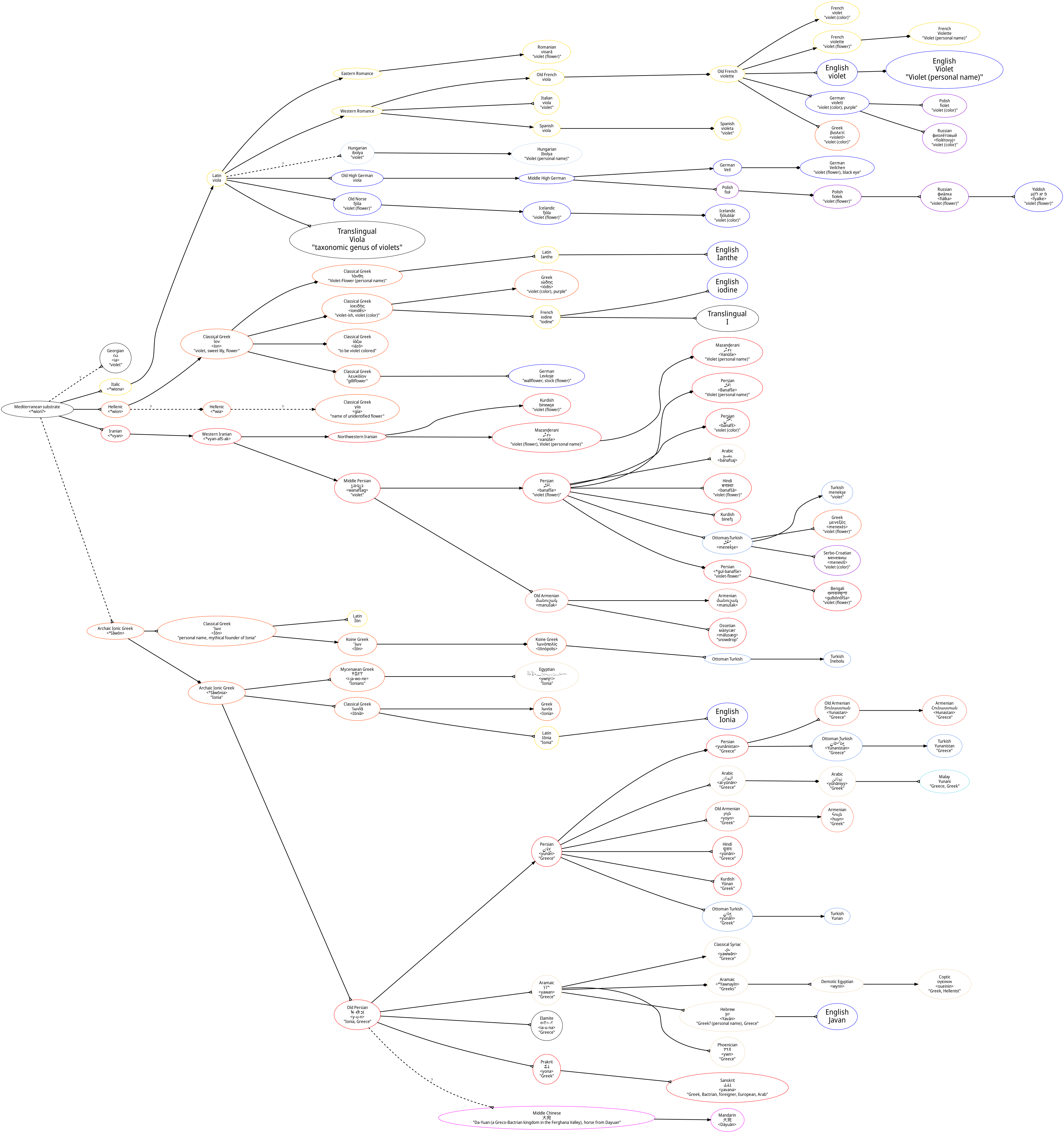Introduction
A Mediterranean/Caucasian substrate word approximately like *wion: "violet (flower)", was borrowed into Hellenic, Iranian, and Italic.
Greek Ionia is probably not related, since the Mycenaean shows 𐀂𐀊𐀺𐀚 i-ja-wo-ne for "Ionians" with digamma in a different position than the *wion expected for "violet" , and Egyptian 𓇌𓅱𓈖𓏭𓉻𓂝𓏛 ywnj-ꜥꜣ supports that.
But it's vaguely possible the Ionians were named for the flower either in the substrate or in an early Attic-Ionic dialectic form, which had already lost the /w/ before lending the name into Mycenaean (Ionic appears to have been the first to lose /w/, already lost by the time Ionic was first written alphabetically). The Egyptian would be expected to be borrowed from contact with Mycenaean speakers (or even from Mycenaean via Minoan speakers).
So while it's not very likely that Ionia is related to "violet", it's another fun little family, and I've taken the opportunity of the possible connection to do both at once.
Teaser
Full Text
-
Mediterranean substrate *wion?
- Georgian ია ia violet [1]
-
Italic *wiona
-
Latin viola
-
Eastern Romance
- Romanian vioară violet (flower)
-
Western Romance
-
Old French viola
-
Old French violette
- French violet violet (color)
-
French violette violet (flower)
- French Violette Violet (personal name)
-
English violet
- English Violet Violet (personal name)
-
German violett violet (color), purple
- Polish fiolet violet (color)
- Russian фиоле́товый fiolétovyj violet (color)
- Greek βιολετί violetí violet (color)
-
- Italian viola violet
-
Spanish viola
- Spanish violeta violet
-
-
Hungarian ibolya violet
- Hungarian Ibolya Violet (personal name)
-
Old High German viola
-
Middle High German
-
German Veil
- German Veilchen violet (flower), black eye
-
Polish fioł
-
Polish fiołek violet (flower)
-
Russian фиа́лка fiálka violet (flower)
- Yiddish פֿיאַלקע fyalke violet (flower)
-
-
-
-
-
Old Norse fjóla violet (flower)
-
Icelandic fjóla violet (flower)
- Icelandic fjólublár violet (color) lit. "violet-blue"
-
- Translingual Viola taxonomic genus of violets
-
-
-
Hellenic *wion
-
Classical Greek ῐ̓́ον íon violet, sweet lily, flower
-
Classical Greek Ἰάνθη Violet-Flower (personal name)
-
Latin Ianthe
- English Ianthe
-
-
Classical Greek ἰοειδής ioeidḗs violet-ish, violet (color)
- Greek ιώδης iódis violet (color), purple
- Classical Greek ἰάζω iázō to be violet colored
-
Classical Greek λευκόϊον gilliflower lit. "white violet"
- German Levkoje wallflower, stock (flower)
-
-
Hellenic *wia
- Classical Greek γία gía name of unidentified flower
-
-
Iranian *vyan
-
Western Iranian *vyan-afš-ak
-
Northwestern Iranian
- Kurdish binewşe violet (flower)
-
Mazanderani ونوشه vanūše violet (flower), Violet (personal name)
- Mazanderani ونوشه Vanūše Violet (personal name)
-
Middle Persian 𐭥𐭭𐭯𐭱𐭪 wanafšag violet
-
Persian بنفشه banafše violet (flower)
- Persian بنفشه Banafše Violet (personal name)
- Persian بنفش banafš violet (color)
- Arabic بنفسج banafsaj
- Hindi बनफ़्शा banafśā violet (flower)
- Kurdish binefş
-
Ottoman Turkish منكشه meneḱşe
- Turkish menekşe violet
- Greek μενεξές menexés violet (flower)
- Serbo-Croatian меневиш meneviš violet (color)
-
Persian *gul-banafše violet-flower
- Bengali গুলবনফ্শা gulbônôfśa violet (flower)
-
Old Armenian մանուշակ manušak
- Armenian մանուշակ manušak
- Ossetian ма́лусӕг málusæg snowdrop -n- to -l- under regular dissimilation of nasals
-
-
-
-
Archaic Ionic Greek *Iā́wōn
-
Classical Greek Ἴων Íōn personal name, mythical founder of Ionia
- Latin Īōn
-
Koine Greek Ἴων Íōn
-
Koine Greek Ἰωνόπολῐς Iōnópolis
-
Ottoman Turkish
- Turkish İnebolu
-
-
-
Archaic Ionic Greek *Iā́wōnia Ionia
-
Mycenaean Greek 𐀂𐀊𐀺𐀚 i-ja-wo-ne Ionians
- Egyptian 𓇌𓅱𓈖𓏭𓉻𓂝𓏛 ywnjꜥꜣ Ionia [2]
-
Classical Greek Ἰωνῐ́ᾱ Iōníā
- Greek Ιωνία Ionía
-
Latin Iōnia Ionia
- English Ionia
-
Old Persian 𐎹𐎢𐎴 y-u-n Ionia, Greece
-
Persian یونان yunân Greece
-
Persian yunânistan Greece
-
Old Armenian Յունաստան Yunastan Greece
- Armenian Հունաստան Hunastan Greece
-
Ottoman Turkish یونانستان Yunanistan Greece
- Turkish Yunanistan Greece
-
-
Arabic اَلْيُونَان al-yūnān Greece
-
Arabic يُونَانِيّ yūnāniyy Greek
- Malay Yunani Greece, Greek
-
-
Old Armenian յոյն yoyn Greek
- Armenian հույն huyn Greek
- Hindi यूनान yūnān Greece
- Kurdish Yûnan Greek
-
Ottoman Turkish یونان yunân Greek
- Turkish Yunan
-
-
Aramaic 𐡉𐡅𐡍 yawan Greece
- Classical Syriac ܝܘܢ yawwān Greece
-
Aramaic *Yawnayīn Greeks
-
Demotic Egyptian wynn
- Coptic ⲟⲩⲉⲓⲛⲓⲛ oueinin Greek, Hellenist
-
-
Hebrew יוון Yaván Greek? (personal name), Greece
- English Javan
- Phoenician 𐤉𐤅𐤍 ywn Greece
- Elamite 𒅀𒌋𒈾 ia-u-na Greece
-
Prakrit 𑀬𑁄𑀦 yona Greek
- Sanskrit 𑀬𑀯𑀦 yavana Greek, Bactrian, foreigner, European, Arab
-
Middle Chinese 大宛 Da-Yuan (a Greco-Bactrian kingdom in the Ferghana Valley), horse from Dayuan lit. "Greater Yuan"
- Mandarin 大宛 Dàyuān
-
-
-
Visual
Collected English words
violet, Violet, Viola, Ianthe, Ionia, Javan
Footnotes
-
^
Possibly Goergian ია ia may be directly related to the substrate word, but it's more likely a contraction of იასამანი iasamani related to jasmine/yasmin (see parallel contraction in Persian یاس yâs).
-
^
Egyptian 𓇌𓅱𓈖𓏭𓉻𓂝𓏛 ywnjꜥꜣ: "Ionia" is more properly "Great Ionia" (compare Chinese 大宛 Da Yuan), with the same Egyptian suffix -ꜥꜣ as in pr-ꜥꜣ "pharaoh", which is literally "great house", meaning "palace" and later (metonymically) "king of Egypt". (Egyptian does not use the same words for foreign kings as for their own.)
